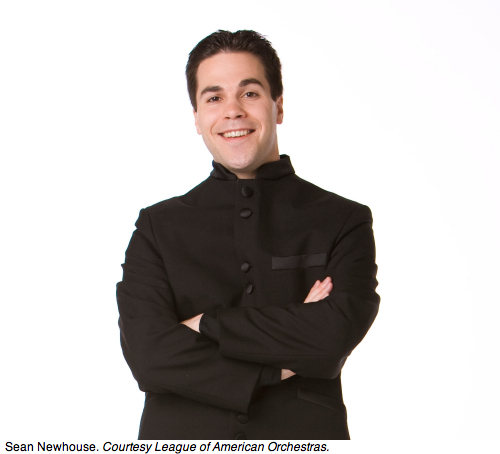BSO assistant conductor makes impressive debut in his own right

Assistant conductor Sean Newhouse led the BSO in music of Britten, Prokofiev and Sibelius Thursday night at Symphony Hall.
In what might be called his “scheduled debut,” Sean Newhouse, one of the Boston Symphony Orchestra’s assistant conductors, led the ensemble in a program of familiar works by Britten, Prokofiev, and Sibelius Thursday night at Symphony Hall.
Last March, Newhouse joined the not-very-exclusive club of conductors who have been called on to substitute for the ailing James Levine, when he led Mahler’s Symphony No. 9 on two hours’ notice. This time, appearing in a duly-scheduled series of three performances, he must have wondered what to do with all that rehearsal time.
Apparently he put it to good use, because the orchestra was with him as he marched it smartly through Britten’s Four Sea Interludes from Peter Grimes, Sibelius’s Symphony No. 2, and Prokofiev’s Piano Concerto No. 3, with the French pianist Jean-Efflam Bavouzet as soloist.
For the most part, Newhouse’s keep-it-moving approach served these old favorites well, finding the good bones under the symphonic flesh. (Speaking of flesh, the BSO was in effect making its “symphonic debut” Thursday night, having opened its season last weekend with violinist Anne-Sophie Mutter leading a couple of dozen BSO players in Mozart concertos.)
Everybody knows that Prokofiev crackles and pops when played snappily and in time, but few appreciate that a little forward momentum actually heightens the broad drama of a Sibelius symphony. On the other hand, Britten’s Sea Interludes aren’t really “symphonic” in character, but more like sketches for a large orchestra. They would have benefited from more attention to their fleeting moods and strange orchestral colors than this performance gave them.
Bavouzet was a genial and efficient soloist in the Prokofiev Third Concerto. Opportunities for elegant or witty turns of phrase were not neglected by pianist or orchestra. Overall, however, the performance emphasized the cool and ironic at the expense of the expansive and lyrical, the latter being one of the main reasons this Prokofiev piano concerto is so much more popular than the other four he wrote. In it, the steel-fingered modernist seemed to get in touch with his inner Rachmaninoff, a mode of expression he would return to in his ballet scores, and a bit more of that would have been welcome here.
For those who perceive Sibelius as a great lumbering beast of a composer, Newhouse’s performance of the Second Symphony would have been a tonic. Not that he raced through the piece, but, for example, with his dance-like tempo, those famous throbbing strings and wind answers of the opening bars made one think more of Beethoven’s Pastoral Symphony than of icebound fjords. This composer’s scoring can sound murky or overripe, but not in this performance. For that, part of the credit goes to Newhouse and part to the lucid acoustics of Symphony Hall. Sibelius’s famous crescendos cranked up splendidly under Newhouse’s steady control, and the symphony’s “second half” of wild scherzo, patriotic trio, and heart-on-sleeve finale was strongly characterized, right up to the triumphant entrance of the Finlandia-like finale theme.
The finale itself, like that of Beethoven’s Fifth, starts with its climax, and hardly knows where to go from there. The closing bars of this movement were the only part that sounded forced and strident in this performance, which is attributable to the composer’s being stuck for an ending, and the orchestra trying to compensate for that by playing louder.
All in all, however, it was an auspicious “official” debut for Sean Newhouse. One would welcome hearing him lead another program, perhaps with some less-familiar tunes in it. None is scheduled for the coming BSO season, but as recent history has shown, musical plans are often made to be broken.
The program will be repeated 1:30 p.m. Friday and 8 p.m. Tuesday. bso.org; 617-266-1200.
Posted in Performances




